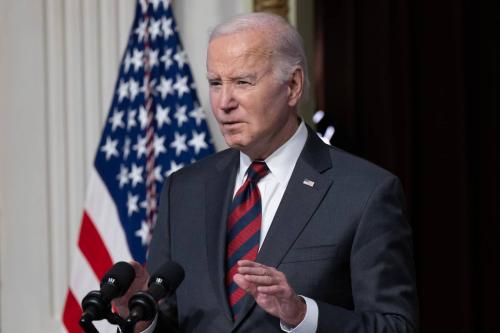Much has been said and written about the fact that economists think our economy is doing exceptionally well while normal people think it’s a mess. President Biden, whose reelection may hinge on a change in that public opinion, seems to be hoping that economic data will do the trick. Thus far, it has not: More people report their own financial situation is worsening (47%) than improving (43%), and their view of the economy as a whole and the president’s economic stewardship remains even more negative.
There are plenty of positive developments that economists and elected officials can and do cite: America’s historically high job creation and new business startups, rapid recovery from COVID-19, and America’s better-than-other-nations’ economic growth.
There are also multiple explanations why most people don’t like the economy or President Biden’s handling of it. Among the common explanations, all partially true, are increased political partisanship and polarization and an increasing bias for public media to report bad news more often than good.
Everyone focuses on inflation. Other economic facts are ignored.
However, eventually, everyone admits the key to public unhappiness is inflation. Even then, like the Indian tale about the blind men describing the elephant, economists and the general public find different facts. The most widely reported price measure, the Consumer Price Index for urban consumers (CPI-U), includes the costs of food, energy, and housing. Economists, hoping to look through volatile price changes, tend to use indexes that exclude food and energy prices—even though it’s clear that those are the prices to which consumers pay most attention.
Economists also focus on the rate at which price levels rise, rather than the price level itself. As a result, economists will say that inflation “has dropped” even though prices continue to rise, albeit more slowly.
Most people, as Harvard economist Stefanie Stantcheva recently reminded the profession, don’t pay attention to economic theory or published indexes—they know what they see at the grocery store and gas station. For them, it doesn’t matter that prices are rising more slowly—they’re still higher than they were. Claims by the president that prices are declining (N.B.: some are) or by economic authorities that “inflation is declining” are widely seen as inaccurate—even dishonest.
Why we should focus on rising wages, not just prices.
Since the public has decided that inflation is not improving, regardless of what politicians or economists may say, it’s time to ask a related question: Can pay catch up to inflation, so people can afford the higher prices?
There are plenty of reasons why everyone, from the president on down, should focus on raising wages enough to catch up to rising prices:
First, because everyone can do something. While most of us can’t do anything about higher grocery prices, we can ask for raises. However, most do not: Stancheva found only 25% surveyed had asked for a raise—and half reported getting what they’d asked. What about the other 75%? Furthermore, as workers at Starbucks, Volkswagen, and other auto companies have recently reminded us, individuals can raise their pay by organizing and working with a union. Encouraging individual action is important because, as Stancheva found in her survey, most people do not believe that employers will raise wages on their own, that instead they will use higher prices to increase corporate profits.
The president and his administration have already acted. The President has given unprecedented support to union efforts, becoming the first president to walk a picket line and having installed a team at the National Labor Relations Board that has begun seriously to enforce workers’ rights. His Federal Trade Commission has acted to stop noncompete contracts that kept fast food workers from changing employers to get higher wages. Last, but certainly not least, the Biden administration’s bipartisan Infrastructure Investment & Jobs Act, CHIPS Act, and Inflation Reduction Act efforts to bring manufacturing back to the U.S. are already raising construction wages, as are the administration’s change in prevailing wage standards1 and will thereafter add high-paid manufacturing jobs, too.
State and local governments have, too. Since 2019, 29 states have the raised the legal minimum wage—22 this year alone. California, notably, set a higher $20/hour minimum for workers in fast food chains.
Another reason for talking about wage increases is that, unlike prices, other people’s wages are invisible and largely unreported. Reports on wages are published every month along with the unemployment rate but little attention is paid to wages and almost none to the separate report comparing wages to inflation.2 (There are, of course, exceptions, such as the articles by my Brookings colleagues and an occasional media report.3) Without greater attention from politicians and the media, changes in wages will remain invisible.
Wages are already catching up to inflation. Shouldn’t people know that?
The most important reason is that, in fact, wages are catching up to inflation. As pandemic-related inflation took off in 2021 and 2022, wages fell behind—but not for long. For almost two years,4 depending on the measure, average wages have been gaining on inflation. Real wages are now, on average, higher than they were before the pandemic. The president doesn’t highlight that, or even mention it.5 Nor do most stories about the economy.
There are, of course, people who don’t want wages to catch up to inflation. Some will raise the ghost of “wage price spirals” from 45 years ago while ignoring how much our economy has changed, so that’s no longer a major threat. Others prefer that economic growth show up more in stock portfolios than paychecks.
Nonetheless, I suspect most people would feel better about the economy if they knew that wages are catching up to inflation. Maybe someone should let them know.
-
Footnotes
- Real construction industry wages bottomed out in 2Q22.
- The Council of Economic Advisors generally comments on real wages in its review of the monthly employment report. However, an unsystematic search of major media coverage of the report found few comparisons of wages to inflation.
- See, e.g., Irwin, Neil “Wages are finally rising faster than inflation” Axios July 12, 2023; Krugman, Paul “Inflation and the Problem of McMisinformation,” New York Times, May 30, 2024
- Avg hourly earnings (total private)/CPI-U bottomed in June 2022.
- In the State of the Union, President Biden did say that “Wages keep going up and inflation keeps coming down!” but made no connection between the two. Furthermore, as noted above, the average non-economist thinks of inflation as a price level, not a change in price levels, and knows that most prices are higher than they were pre-COVID-19. Blogs from the Council of Economic Advisors do discuss real wage growth and NEC Director Lael Brainard does say in public talks that “real wages” are rising and higher than pre-pandemic levels, but the concept of “real wages” does not seem generally understood.







Commentary
We should focus on rising wages, not just inflated prices
June 11, 2024